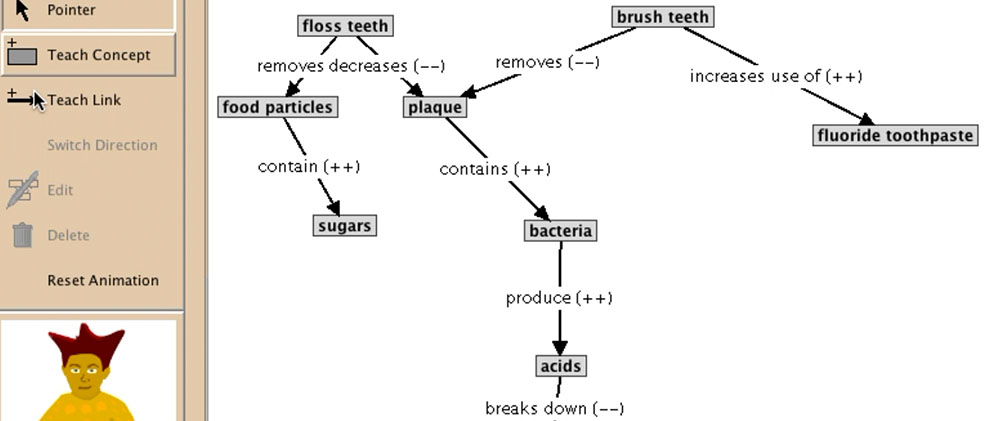The Willful Pupil Project
From The Theme
SOCIAL AND COMPUTING SCIENCES
WHAT IF
What if we could develop and use “teachable” computer agents to test the wisdom that people learn by teaching?
WHAT WE SET OUT TO DO
We set out to develop and implement a “Teachable Agent” that was “willful” – exhibiting intentions in dialog that would sometimes compete with those of the user. Our hypothesis was that this type of active engagement would increase the sense of real teaching, and in turn, this would lead users to engage longer and learn more from their agent.
WHAT WE FOUND
Initial testing found that our existing agent architecture was too limited to sustain interaction over the extended time necessary for deep learning. We developed a new agent designed to sustain mixed-initiative interactions.
We created a new class of agent (Moby) and successfully tested its effects on 100 high school students’ learning in the domain of logical reasoning. This project contributes to a suite of reasoning agents that could be used in supporting the development of an educational video game.
Moby is a Java-based Teaching Assistant that helps students to learn about logical reasoning through hypothesis testing and induction using school-based science content in a game environment. Moby supports hypothesis visualization during induction and employs teaching interfaces that help students learn to structure their deductive inferences.
For our project, we developed a shared context that Moby could refer to, created a game environment that permits strategizing, and included a second agent that competes with the first.
In our research experiments, students who “taught” Moby performed significantly better than those with limited or no interaction with the agent. In order to “teach” Moby, students had to formulate their knowledge sufficiently to create a rule that Moby could use. In addition, these students were also more prepared to understand and learn from the feedback that came from the operation of their rule in a gaming context.
LEARN MORE
Stanford Graduate School of Education AAALab Teachable Agents Research
Learning by Teaching Human Pupils and Teachable Agents: The Importance of Recursive Feedback. (2013) Okita, S.Y. & Schwartz, D.L. The Journal of the Learning Sciences.
Preparing students for future learning with Teachable Agents. (2010) Chin, D.B., Dohmen, I.M., Cheng, B.H., Oppezzo, M.A., Chase, C.C., & Schwartz, D.L. Educational Technology Research and Development
Teachable agents and the protege effect: Increasing the effort towards learning. (2009) Chase, C., Chin, D.B., Oppezzo, M, & Schwartz, D.L. Journal of Science Education and Technology
Animations of thought: Interactivity in the teachable agents paradigm. (2007) Schwartz, D. L., Pilner, K. B., Biswas, G., Leelawong, K., & Davis, J. In R. Lowe & W. Schnotz (Eds.), Learning with Animation: Research and Implications for Design. UK: Cambridge University Press.
Distributed learning and mutual adaptation. (2006) Schwartz, D.L. & Martin, T. Pragmatics & Cognition
PEOPLE BEHIND THE PROJECT
 Daniel Schwartz is Dean of Stanford Graduate School of Education and Nomellini & Olivier Professor of Educational Technology. He is an expert in human learning and educational technology. Schwartz oversees a laboratory whose computer-focused developments in science and math instruction permit original research into fundamental questions of learning. He has taught math in rural Kenya, English in south-central Los Angeles, and multiple subjects in Kaltag, Alaska. This diversity of experience informs his work. Among many honors, Schwartz was named Graduate School of Education Teacher of the Year for 2015.
Daniel Schwartz is Dean of Stanford Graduate School of Education and Nomellini & Olivier Professor of Educational Technology. He is an expert in human learning and educational technology. Schwartz oversees a laboratory whose computer-focused developments in science and math instruction permit original research into fundamental questions of learning. He has taught math in rural Kenya, English in south-central Los Angeles, and multiple subjects in Kaltag, Alaska. This diversity of experience informs his work. Among many honors, Schwartz was named Graduate School of Education Teacher of the Year for 2015.
